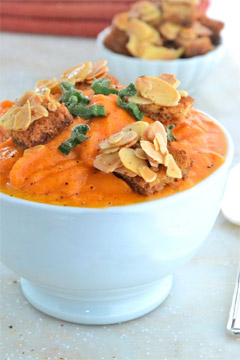|
|
|
 , ,
Font size |
FODMAP diet: First-line Therapy for IBS Sufferers.

FODMAPs represents a collection of foods to which a large number of people are
highly sensitive. These people need to pay attention to the FODMAPs in their
diets if they hope to avoid painful digestive issues.
The restriction of these FODMAPs from the diet has been found to have a
beneficial effect for sufferers of irritable
bowel syndrome and
other functional gastrointestinal disorders (FGID).
Lactose, fructose, fructans and polyols are the most common short-chain fermentable carbohydrates in your food and are sometimes referred to as FODMAPs, which stands for fermentable oligo-, di- and mono-saccharides and polyols.
|
F is for Fermentable -
Fermentable carbohydrates are carbohydrates that are fermented by
bacteria instead of broken down by our digestive enzymes. In most
people, some fermentable carbohydrates are healthy sources of food for
the (helpful) bacteria that ferment them; these can include the prebiotics.
In people with FODMAPs intolerance, certain carbohydrates can
become too fermentable, resulting in gas, bloating,
pain, and poor digestion, as well as proliferation of unwanted
pathogenic bacteria.
O is for
Oligosaccharides - Oligosaccharides are short-chain carbohydrates,
including fructans (fructooligosaccharides, or FOS, and inulin) and
galactans (raffinose and stachyose). Fructans are chains of fructose with
a glucose molecule at the end; galactans are chains of galactose with a
fructose molecule. Sources of fructans include wheat, rye, barley,
onion, garlic, Jerusalem and globe artichoke, asparagus, beetroot,
chicory, dandelion leaves, leek, radicchio, the white part of spring
onion, broccoli, brussels sprouts, cabbage, fennel, chocolate and
prebiotics such as fructooligosaccharides (FOS), oligofructose and
inulin. Pulses and beans are the main dietary sources of galactans.
D is for Disaccharides
- These are pairs of sugar molecules, with the most problematic being
the milk sugar lactose (a
galactose molecule with a glucose molecule). Any dairy that contains
significant amounts of lactose, like milk or soft cheeses. Depending on
your sensitivity, cream or butter can even do the trick.
M is for
Monosaccharides - This describes a single sugar molecule. Free fructose
is the monosaccharide to watch out for with FODMAPs intolerance. Fruits,
vegetables and honey all contain monosaccharides. Some sources of
fructose would be: pears, apples, grapes, mangoes, apples, apricots,
bananas, carrots, and sweet potatoes.
A is for And - Every
list needs a good conjunction.
P is for Polyols -
Polyols include sugar alcohols like xylitol, sorbitol, or maltitol.
Polyols are found naturally in some fruit (particularly stone fruits),
including apples, apricots, avocados, blackberries, cherries, lychees,
nectarines, peaches, pears, plums, prunes, watermelon and some
vegetables, including cauliflower, mushrooms and mange-tout peas.
Who all can Benefit from FODMAPs Diet.
-
 Someone with small intestinal bacterial overgrowth (SIBO):
The entire gastrointestinal tract, including the small intestine,
normally contains bacteria. The number of bacteria is greatest in
the colon but much lower in the small intestine. Also, the types of
bacteria within the small intestine are different to the types of
bacteria within the colon. Small intestinal bacterial overgrowth (SIBO)
refers to a condition in which abnormally large numbers of bacteria
are present in the small intestine, while the types of bacteria
found in the small intestine are more like the bacteria found in the
colon. The symptoms of SIBO are abdominal pain, bloating, wind, constipation and
diarrhoea. In advanced cases, there may be vitamin and mineral
deficiencies and weight
loss. Someone with small intestinal bacterial overgrowth (SIBO):
The entire gastrointestinal tract, including the small intestine,
normally contains bacteria. The number of bacteria is greatest in
the colon but much lower in the small intestine. Also, the types of
bacteria within the small intestine are different to the types of
bacteria within the colon. Small intestinal bacterial overgrowth (SIBO)
refers to a condition in which abnormally large numbers of bacteria
are present in the small intestine, while the types of bacteria
found in the small intestine are more like the bacteria found in the
colon. The symptoms of SIBO are abdominal pain, bloating, wind, constipation and
diarrhoea. In advanced cases, there may be vitamin and mineral
deficiencies and weight
loss.
-
Anyone with IBS: According to a study (http://www.ncbi.nlm.nih.gov/pubmed/20659225),
Gastrointestinal symptoms and lethargy were significantly induced by
the high FODMAP diet in patients with IBS,
while only increased flatus production was reported by healthy
volunteers.
-
Patients Suffering from chronic stress: First, stress
inhibits the action of GLUT2, a transporter responsible for the
small intestinal absorption of glucose, fructose, and galactose in
the gut. If you’re unable to adequately absorb the sugar molecules
in the small intestine, they end up making it to your large
intestine for fermentation by colonic bacteria. Second, stress has
an immediate impact on the composition and function of your gut
flora, rendering your populations less diverse and allowing certain
pathogenic species to overpopulate.
-
Unexplained digestive problem: If
don’t feel right after eating almost anything. Maybe you’re
chronically constipated (or the opposite). Trying a low-FODMAP diet
can help you narrow your focus and start to identify some culprits.
If you decide to embark on a low-FODMAP diet, consider keeping a diet
journal to log your food, its dosage and track your reactions to
individual FODMAPs. Some people might really react poorly to fructose
while having no issues with lactose.
Note that different FODMAPs affect different people differently. You can
tolerate some and not others.
Dated 04 April 2014
Related Articles
|
|
|
|
|









